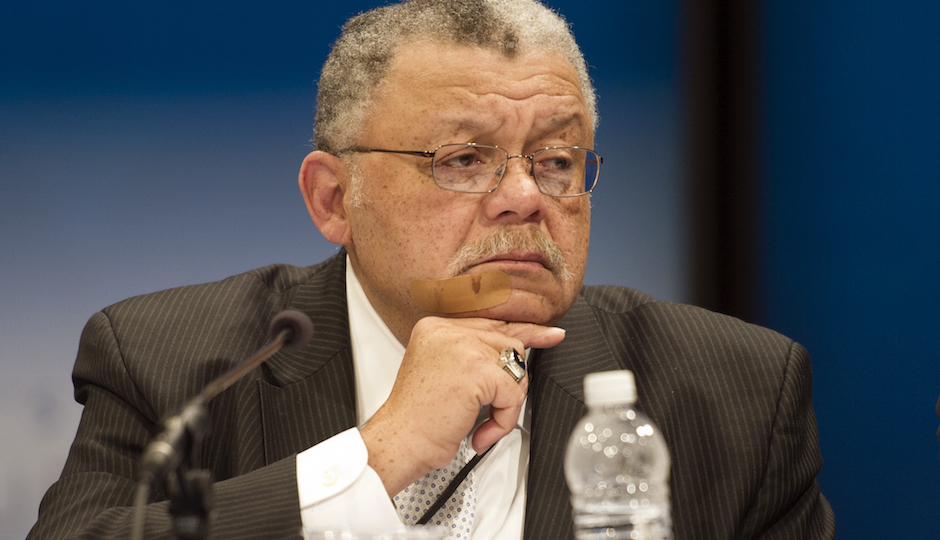Why Commissioner Ramsey Must Stay

Philadelphia Police Commissioner Charles Ramsey, co-chair, the President’s Task Force on 21 Century Policing, listens to witnesses at the Newseum in Washington, Tuesday, Jan. 13, 2015. (AP Photo/Cliff Owen)
There’s been a bit of talk about the future of Police Commissioner Charles Ramsey lately, so let’s just say what needs to be said: Ramsey must stay on in the next mayor’s administration, at least for the first year or so.
Whether he wants to is anybody’s guess — his post-Philly opportunities will probably be quite lucrative — and it’s possible, despite widespread praise for Ramsey, that the next mayor will want his or her own man or woman in the job.
But Ramsey is currently spearheading one of the largest reform efforts the Philadelphia Police Department has ever seen. Fully adopting and embedding those reforms will take a defined amount of time: the next 18 months. That duration spills over into the first months of the next mayor’s term, which is traditionally the beginning of a new commissioner’s time in office. But for the sake of the community — and the sake of Ramsey’s own legacy both here and nationally — he should be allowed to complete the task he has begun.
More importantly, the reform effort may need Ramsey’s involvement in order to fully take root.
The Task at Hand
When Ramsey took the job as Philly’s top cop seven years ago, he arguably had two big goals to achieve.
The first — and, in the voting public’s mind, the most important — goal was to bring down the city’s staggering crime rate. While Philadelphia’s murder rate is still too high, the murder counts of 247 in 2013 and 248 in 2014 represent a giant drop from the 389 deaths reported during the “Killadelphia” days of 2007, the year of the last contested mayoral election.
Of course, it might be argued that Ramsey is the beneficiary of generational trends that belatedly hit town after the murder rate dropped just about everywhere but Philly years ago, but fair’s fair: He would’ve taken the blame if the homicide rate had remained stubbornly high, and he should get some credit for innovations — like using police cars as quasi-ambulances to ferry gunshot victims to hospitals — that may have actually lowered the death rate. Good for him.
So, mission accomplished?
Not quite. Because the second goal is still largely undone. Ramsey was also brought in to clean up a departmental culture that, if not itself corrupt, was widely (and not wrongly) seen as a place where corruption could flourish. Narcotics squad scandals have been happening for years; so have videotaped police beatings of suspects. These aren’t exactly recent developments.
For much of his tenure, it has seemed that Ramsey has played whack-a-mole with the problem, trying to fire as many dirty cops as he could. (Almost always, those bad cops got their jobs back after arbitration.) There were times when maybe he even deserved some of the blame for the problem. But two things happened — one of them initiated by Ramsey himself — that have set the stage for a more transformative effort within the department.
The first event was Ramsey’s decision — prompted by the reporting of Sam Wood at Philly.com — to invite the Department of Justice to examine the department’s use-of-force practices and offer recommendations. (Slag Ramsey all you want: He didn’t have to do that.) That resulted in last-month’s wide-ranging report lamenting the “undercurrent of significant strife” and recommending a wide range of training and rules reforms to improve the department’s practices and credibility in the community.
The second event was — from a wider Philadelphia perspective — almost a happy accident: Ramsey was picked to co-chair the president’s Task Force on 21st Century Policing, which came with its own list of reforms. Having helped describe the ideal police department, Ramsey could hardly avoid trying to fashion his own department in its image.
And that brings us to today: The two reform efforts have been wrapped into one package, to be overseen by an independent review board, with additional reports required to the feds in six months, and then again 12 months after that. It will be a busy time within the department. The good news? The existence of the review board and DOJ oversight mean the reform effort is not entirely dependent on one man. This is not a cult-of-personality situation we’re talking about here.
But I’m not sure that changing horses in the middle of this particular stream will be helpful. No, Ramsey doesn’t always seem like a natural reformer — he (naturally) defends the integrity of his department even when there are viable reasons for the rest of us to doubt — but that may actually give him the greatest credibility in trying to advance the cause: The Police Department, you may have noticed, is (ahem) a touch insular and resistant to change. It’s easier to accept changes when you know they’re being made by a friend, with your well-being in mind.
Believe it or not, reform should be beneficial to the Philadelphia Police Department. A department that doesn’t face an “undercurrent of strife” with the community — that is trusted and respected instead of merely feared — is one that works better with members of that community to keep everybody safe.
We might be closer to achieving that result than we’ve been in a long time. Here’s hoping Ramsey finishes the job.
Follow @JoelMMathis on Twitter.


